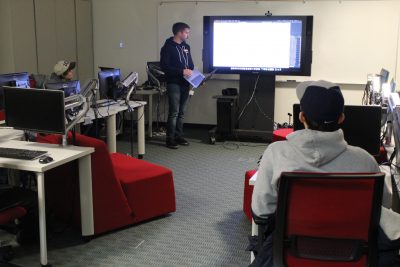 On Friday, February 22nd, OPIM Innovate hosted its Splunk Analytics Workshop. There, Professor Ryan O’Connor, UConn adjunct and Splunk Senior Advisory Engineer, explained to students the origin of Splunk and its uses. Other than Splunk’s three premium solutions: Splunk Information Technology Service Intelligence, Splunk Enterprise Security, and Splunk User Behavior Analytics, attendees also learned of the knowledgeable and supportive community behind the service. From dedicated end-users to passionate Splunk professionals, this community develops intuitive applications utilizing Splunk while also answering each other’s questions. Splunk, therefore, is a user-oriented platform which does everything in its power to help companies and individuals succeed with its data monitoring and visualization software.
On Friday, February 22nd, OPIM Innovate hosted its Splunk Analytics Workshop. There, Professor Ryan O’Connor, UConn adjunct and Splunk Senior Advisory Engineer, explained to students the origin of Splunk and its uses. Other than Splunk’s three premium solutions: Splunk Information Technology Service Intelligence, Splunk Enterprise Security, and Splunk User Behavior Analytics, attendees also learned of the knowledgeable and supportive community behind the service. From dedicated end-users to passionate Splunk professionals, this community develops intuitive applications utilizing Splunk while also answering each other’s questions. Splunk, therefore, is a user-oriented platform which does everything in its power to help companies and individuals succeed with its data monitoring and visualization software.
During the workshop, O’Connor introduced students to time series data, which is how Splunk got its initial patent. In short, time series data is data that has been indexed on a time scale, either to organize the data or to derive conclusions from certain time intervals. For example, credit card companies use time series data in order to deduce whether or not purchases are being made by the authentic cardholder. In Splunk, machine data is categorized and searchable by date and uses time to sort out feasible and non-feasible data. If a purchase is made in one store in Connecticut, and then another store in Vermont 30 minutes later, chances are the card in question has been compromised.
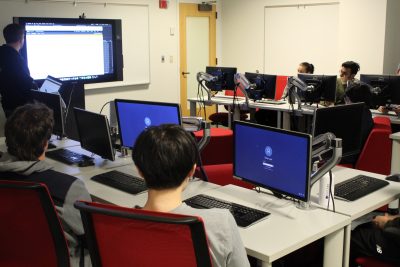 Splunk is a very flexible service that allows users to integrate data from other software such as SQL Developer, a database client. “Databases are everywhere and important,” O’Connor explained to students, “but, some database clients don’t visualize data well. They just store it, keep its structure, and that’s it.” That is why O’Connor developed an application, called DB Connect, that can grab database information, make a copy of the data inside of Splunk, and then visualize it. “It can make pie charts, line charts, or whatever the case may be,” said O’Connor. “Splunk isn’t designed to replace any one of these [database clients], but instead to aggregate data from them.” Splunk can also capture real-time web data, such as the number of times a server is pinged by a computer or the number of times it is successfully infiltrated.
Splunk is a very flexible service that allows users to integrate data from other software such as SQL Developer, a database client. “Databases are everywhere and important,” O’Connor explained to students, “but, some database clients don’t visualize data well. They just store it, keep its structure, and that’s it.” That is why O’Connor developed an application, called DB Connect, that can grab database information, make a copy of the data inside of Splunk, and then visualize it. “It can make pie charts, line charts, or whatever the case may be,” said O’Connor. “Splunk isn’t designed to replace any one of these [database clients], but instead to aggregate data from them.” Splunk can also capture real-time web data, such as the number of times a server is pinged by a computer or the number of times it is successfully infiltrated.
For those interested in Splunk, Splunk Fundamentals I and II are free for UConn students. The ability to use Splunk Analytics is a very marketable skill, especially for those interested in entering the world of information technology. Also, on March 8th, OPIM Innovate will also be hosting Splunk Day, where students can network with Splunk professionals. Don’t let these important networking opportunities pass you by! Get started with Splunk, today!
 Originally from Neshanic Station, New Jersey, junior management information systems major
Originally from Neshanic Station, New Jersey, junior management information systems major 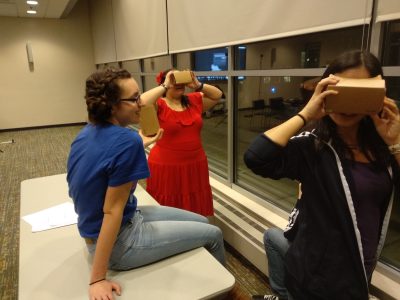 On Friday, February 22nd, OPIM Innovate co-hosted the Totally Teched Out Late Night Event in collaboration with UConn Late Night. In the Student Union, Room 104, a number of students from different academic backgrounds interacted with emerging technologies such as virtual reality headsets and leading software like Splunk Enterprise and HP Reveal. While many students walked in without prior knowledge of OPIM Innovate, they left with a piqued interest regarding what the initiative has to offer.
On Friday, February 22nd, OPIM Innovate co-hosted the Totally Teched Out Late Night Event in collaboration with UConn Late Night. In the Student Union, Room 104, a number of students from different academic backgrounds interacted with emerging technologies such as virtual reality headsets and leading software like Splunk Enterprise and HP Reveal. While many students walked in without prior knowledge of OPIM Innovate, they left with a piqued interest regarding what the initiative has to offer.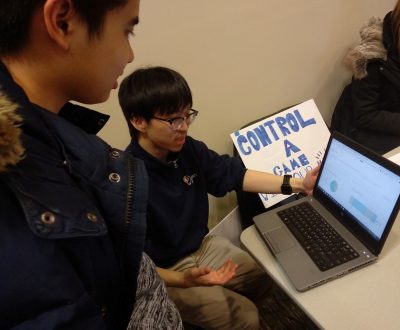 For some students, the Innovate Room at the Totally Teched Out Late Night Event was the first time they had ever encountered some emerging technologies or software. Xiaofeng Gong (’20 Mathematics and Economics), for example, had never heard of Splunk Enterprise before being introduced to the software by Nathan Hom. “A
For some students, the Innovate Room at the Totally Teched Out Late Night Event was the first time they had ever encountered some emerging technologies or software. Xiaofeng Gong (’20 Mathematics and Economics), for example, had never heard of Splunk Enterprise before being introduced to the software by Nathan Hom. “A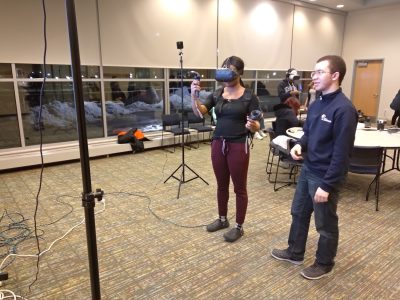 For the students running the Innovate Room, the hustle and bustle was worth every minute of getting to see interest emerge in another student’s face.
For the students running the Innovate Room, the hustle and bustle was worth every minute of getting to see interest emerge in another student’s face. 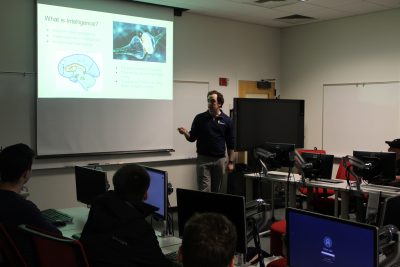 On Friday, February 15th, OPIM Innovate held its Introduction to Artificial Intelligence (A.I.) Workshop from 1:00 PM to 3:00 PM in the Gladstein Lab, BUSN 309. Led by
On Friday, February 15th, OPIM Innovate held its Introduction to Artificial Intelligence (A.I.) Workshop from 1:00 PM to 3:00 PM in the Gladstein Lab, BUSN 309. Led by  After a brief overview of the different areas and categories of artificial intelligence, students were paired up for an introductory activity. During this activity, one student from each group was told to keep their head down while the other student was shown a picture on the projector screen. Once the picture was covered back up, the students who had seen the image were told to explain to their partners how to draw it without context (for example, you could not say “cat” or “falling”). Instead, they could only explain things mathematically in angles, degrees, and shapes, mimicking the understanding of a computer. Both partners had an opportunity to draw and give directions, and many students were scratching their heads in the process. The photo on the left is of the drawings I and junior finance major
After a brief overview of the different areas and categories of artificial intelligence, students were paired up for an introductory activity. During this activity, one student from each group was told to keep their head down while the other student was shown a picture on the projector screen. Once the picture was covered back up, the students who had seen the image were told to explain to their partners how to draw it without context (for example, you could not say “cat” or “falling”). Instead, they could only explain things mathematically in angles, degrees, and shapes, mimicking the understanding of a computer. Both partners had an opportunity to draw and give directions, and many students were scratching their heads in the process. The photo on the left is of the drawings I and junior finance major 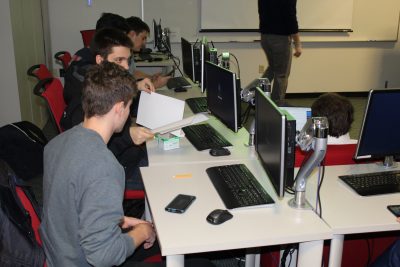 After the workshop, students were left baffled with how immense the world of artificial intelligence has become. One student, junior MIS major
After the workshop, students were left baffled with how immense the world of artificial intelligence has become. One student, junior MIS major 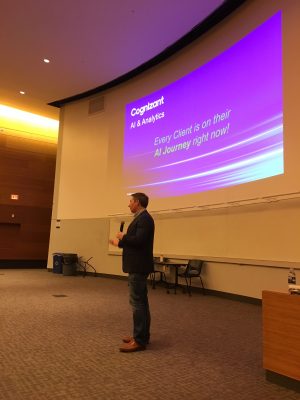 On Monday, February 11th, the Operations and Information Management (OPIM) Department held their annual executive lecture, a lecture series in which seasoned professionals in the field of information technology (IT) are invited to speak about their perspectives on the field. This year’s lecturer,
On Monday, February 11th, the Operations and Information Management (OPIM) Department held their annual executive lecture, a lecture series in which seasoned professionals in the field of information technology (IT) are invited to speak about their perspectives on the field. This year’s lecturer,